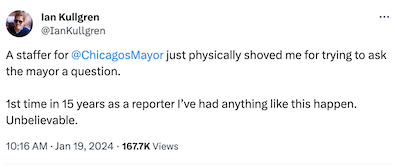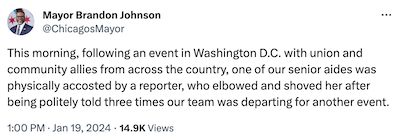|
Isabel’s afternoon roundup
Friday, Jan 19, 2024 - Posted by Isabel Miller
* Press release…
* I demand justice!…
…Adding…
* Here’s the rest…
* Sun-Times | With end of cash bail, ‘dramatic increase’ in appeals from people ordered held in jail or told to submit to restrictions to be released: Illinois appellate courts have been hit with a “dramatic increase” in appeals since the elimination of cash bail from people challenging orders keeping them in jail or imposing conditions like electronic monitoring for their release. The state’s high court announced Tuesday it is creating a task force of appellate court justices to study the issue. The task force is slated to hold its first meeting in the next two weeks and is expected to give a report to the Supreme Court within 45 days. * Tribune | Lockport student alleges District 205 failed to monitor student in alleged sexual assault: A Lockport Township High School District 205 student and her parents filed a lawsuit against the district alleging she was sexually assaulted by a junior varsity basketball player and former student in December 2022. The lawsuit, filed Jan. 8 against the district, names Superintendent Robert McBride and Anthony Cundari, assistant superintendent for personnel. * Sun-Times | Firm tied to former Chicago top cop David Brown back at police academy after being dumped over cost: A Texas firm with ties to former Supt. David Brown is back training officers at the police academy after being dumped by the Chicago Police Department over cost concerns after Brown left the department. Last May 19, then-interim police Supt. Fred Waller told police reform chief Tina Skahill to notify Professional Law Enforcement Training that “CPD will no longer need their services as of June 1,” citing the “significant cost.” * Patch | ‘Condescending’: DuPage Officials Disagree Over Night Meetings: Two Democratic DuPage County Board members differed over whether to hold a night board meeting this year. One accused the other of being “condescending.”In October, member Dawn DeSart, who represents Naperville-based District 5, proposed two night meetings, as opposed to the usual daytime sessions. * Crain’s | UChicago grad union adds pressure to university’s poor financial position: Graduate Students United, or GSU, which represents some 3,000 graduate students at the university, told Crain’s that UChicago officials are now using its recent public debt issues and a $239 million budget deficit as reasons not to meet the union’s financial demands. * Lake County News-Sun | Supportive workplace key to recovery after tragedies like parade shooting, expert says; ‘Crises like these can create a huge sense of loss’: “People need to know and feel that unwavering sense of support from their employer, where for many people that’s their community and their immediate support system,” said Bernie Wong, principal knowledge lead at MindShare Partners, a nonprofit organization focused on creating mentally healthy workplace cultures. * CNI | Back wages totaling more than $5 million owed to thousands of Illinois workers: The U.S. Department of Labor is currently holding more than $5 million in wages owed to more than 7,000 Illinois workers, and the department has launched a new website in an effort to return it. * SJ-R. | Sangamon County State’s Attorney appoints a new top lieutenant: Mary Beth Rodgers, chief of the office’s felony division, was named First Assistant State’s Attorney Thursday by John Milhiser, who returned to the State’s Attorney office in November after serving as U.S. Attorney for the Central District of Illinois during the Donald Trump presidency. * Daily-Journal | Will County declares emergency, announces opening of nuclear plant warm water siphons into Kankakee River: The Will County Emergency Management Agency has coordinated with Constellation Energy to activate all three siphons of warm water from the Dresden Energy Center cooling lake to accelerate the melting of ice on the Kankakee River. This decision follows a declaration of emergency by county executive Jennifer Bertino-Tarrant due to the historic flood levels and ice jams along the Kankakee River. * Sun-Times | Even after Burke conviction, some on City Council still resist banning outside income: Downtown Ald. Brendan Reilly (42nd) noted an outright ban would force his colleague, Ald. Anthony Napolitano (41st), to stop coaching a youth hockey league, for which Napolitano is paid a stipend of roughly $6,500 a year. * Herald-Whig | New Corn Belt Ports office hopes to accelerate Tri-State growth, investment: “We think working more closely with the Tri-State Development Summit, which is housed at Culver-Stockton, will help accelerate growth and investment in the Tri-State region,” Corn Belt Ports Executive Coordinating Director Bob Sinkler said. * Center Square | Illinois pays hefty sum to participate in Rose Parade: According to documents obtained by The Center Square, the cost of constructing the Enjoy Illinois float, the performances and the entry fee cost taxpayers $560,000. The 24-foot-tall float took three months to build using about 22,000 volunteer hours and featured 30,000 flowers. The state hired the vocal group Straight No Chaser to ride and sing on the float. * Sun-Times | Soldier who sold guns used by Chicago gang members in 2 mass shootings pleads guilty: Brandon Miller told investigators he joined the Army to escape the mean streets of Chicago, where he said he was going to “funeral after funeral after funeral.” He was in the field artillery at Fort Campbell on the Kentucky-Tennessee border, where he specialized in operating the computers that guide artillery and missiles. * Daily Herald | Authorities: Glendale Heights village president pushed police chief : According to the charge, Khokhar shoved Glendale Heights Police Chief George Pappas with both hands as Pappas stood in front of him on Oct. 25. The misdemeanor battery charge was added Friday to Khokhar’s disorderly conduct case, in which he is accused of making a false report to police. * Sun-Times | University of Illinois system freezes in-state tuition at all 3 of its campuses for 2024-25 school year: The Board of Trustees approved tuition rates for the 2024-25 academic year Thursday. Rates will remain unchanged for the seventh year of the last 10 years, the school said in a press release. * Daily Herald | Six state police vehicles hit in a week serves as reminder of Scott’s Law: The good news is that none of the state troopers suffered life-threatening injuries. The bad? State police say at least three of the drivers who hit the squads were violating Scott’s Law, aka the Move Over Law, when the crashes occurred. Another is accused of driving under the influence. * Block Club | White Sox Should Stay In Bridgeport, Alderperson Says As Team Eyes South Loop Stadium: Prominent developer Related Midwest owns the land, which was also floated as a casino site before Bally’s won the contract to build it in River West. Ald. Pat Dowell (3rd), whose ward includes the site named for what could be the city’s 78th official community area, said in a statement she will “meet soon” with Related Midwest “to discuss the possibility of a stadium being built for the Chicago White Sox.” * NBC Chicago | The Chicago ‘rat hole’ is no longer a hole — it appears to have been filled in: Photos from the scene, in the 1900 block of West Roscoe Street, showed the former rodent-shaped engraving filled in with what appeared to be plaster or concrete. Coins and other trinkets left as part of “rat hole” shrine were strewn about, surrounded by snow and ice. * Tribune | The ‘Chicago Rat Hole’ draws devoted fans bringing gifts for the city’s new tourist attraction: Neighbors in the area told Dumaine the spot has been there for nearly 20 years and that the mark was actually left by a squirrel, not a rat. But the rodent-inspired name has endured. “Chicago prides itself on all of the things that make Chicago difficult, and no matter how much Chicago hates rats, they love rats. It’s a part of our culture,” Dumaine said. * The American Prospect | How Boeing Ruined the JetBlue-Spirit Merger: This week, the sixth-largest and seventh-largest U.S. airlines, JetBlue and Spirit, were denied the opportunity to merge. Stripped from context, it doesn’t sound like an earth-shattering development. But the ruling by Judge William Young, a Reagan appointee, signals the end of four decades of unstoppable waves of airline consolidation that have damaged passengers, workers, smaller communities, and commerce. More broadly, it’s another victory for the Biden Justice Department’s aggressive antitrust enforcers, who are drawing the line at additional concentration. * Daily Herald | Coyotes are more active this time of year. Here’s how to keep your pets safe: The police department post recommends that residents keep unattended dogs and cats indoors or in enclosed areas if they have to be outside, especially at night. It also implored people to keep their dogs on short leashes while walking them outside, preferably six feet or less. * WTTW | Is Chicago’s Cold Snap Good News in the Fight Against Invasive Species? Not When It Comes to Spotted Lanternfly: During a recent educational webinar, hosted by University of Illinois Extension to spread awareness of the pest and the efforts to contain it, attendees questioned whether an arctic blast wouldn’t take care of the problem naturally. Presenter Tricia Bethke, forest pest outreach coordinator at Morton Arboretum, quickly dashed those hopes. * The Messenger | Mississippi Pauper’s Grave Where Police Buried Dexter Wade Without Telling His Mother Has 671 More Names in Logbook: A logbook for a pauper’s cemetery in Mississippi that has been in the spotlight since at least three families say their missing loved ones had been buried there without their knowledge or consent indicates that more than 600 people have been buried in the graveyard since 2008, according to reports.
|
|
After Bloomberg reporter says he was ’shoved’ by mayoral staffer, mayor claims reporter was instigator
Friday, Jan 19, 2024 - Posted by Rich Miller * This morning…  A few hours later…  …Adding… Fox News…
|
|
Illinois Supreme Court rules against local pension fund fiefdoms
Friday, Jan 19, 2024 - Posted by Rich Miller
* Press release…
* It was a pretty slam dunk case…
The Illinois Municipal League and the Associated Firefighters of Illinois supported the state’s position. …Adding… House Speaker Chris Welch…
|
| « NEWER POSTS | PREVIOUS POSTS » |

















